99+ Successful ChatGPT Prompts for Literature Review to Improve Your Writing Brilliance
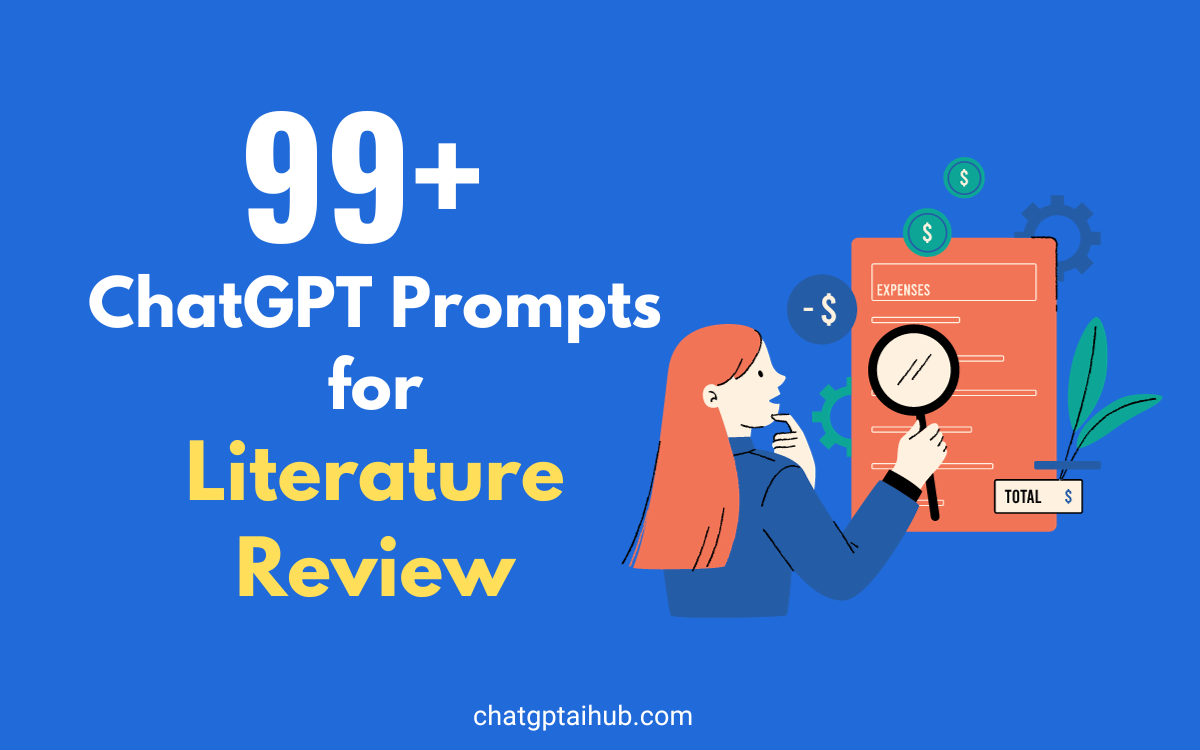
Have you ever wondered how to improve your literacy review skills? Let’s dig in the world of ChatGPT Prompts for Literature Review. Know the power of these Custom-Built ChatGPT Prompts to spark creativity and engage with insightful content. Crafted for seamless integration, these Best ChatGPT Prompts are your key to a brilliant and effective research writing process.
Did you ever struggle to find out an article’s exact thoughts? Many face this challenge, often finding it tough to express ideas seamlessly. ChatGPT Prompts for Literature Review are the game-changer you’ve been seeking. Don’t let a blockage of ideas get you down as these Custom-Built ChatGPT Prompts empower you to effortlessly organize and communicate your thoughts, making your writing process a breeze.
Jump into ChatGPT Prompts for Literature Review and witness a transformation in your writing process. Crafted for simplicity, these prompts empower you to express thoughts seamlessly, ensuring your articles captivate and resonate with your audience.
How ChatGPT Prompts for Literature Review Transform Your Review Skills
Navigating the complex landscape of article review just got simpler with ChatGPT Prompts for literature review. Custom-built prompts save time and energy for AI-involved professionals, streamlining the review process effortlessly. In the fast-paced AI landscape, where precision is paramount, leveraging pre-built prompts guarantees a seamless articulation of ideas.
Mastering the details of literature review is crucial for professionals. ChatGPT Prompts for literature Review provide a solution by offering pre-built prompts, saving professionals time, energy, and the hassle of crafting optimized prompts. These prompts ensure a streamlined writing process, enhancing productivity and effectiveness in the dynamic AI landscape. Say goodbye to the complexities of article review and welcome a simplified, efficient approach with ChatGPT Prompts.
How to use these prompts?
when we input our query to chatgpt, it has a limited length of 10,000 Characters. So your article can be of bigger length than this. in this case, you will do the following things.
Open a new Chat in ChatGPT.
Give Prompt:
I am providing you with the article. Remember it. Don’t provide me with any response. Just remember it. I will provide you the instructions in next prompt. Then you will give response according to the instructions. For now, just remember. I will be providing my article in 2 or 3 parts due to the length. [Input article]
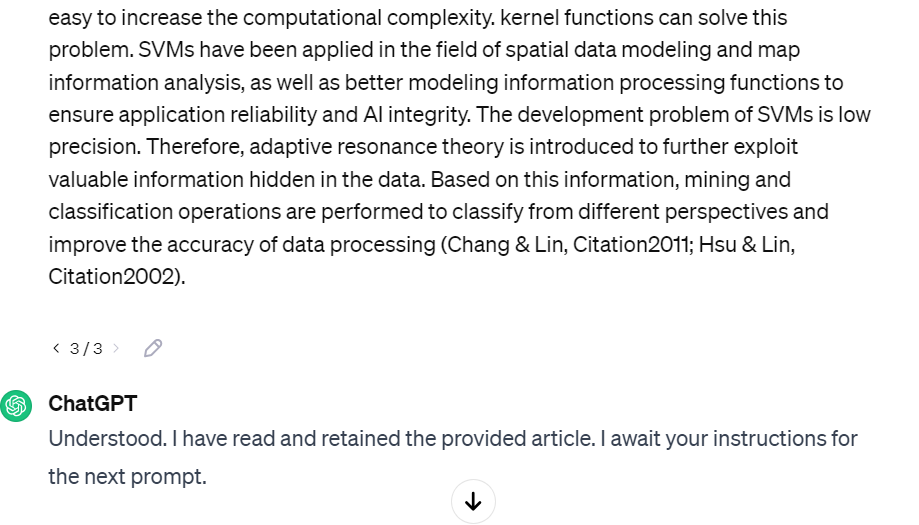
Now, you can choose any prompt from below list and paste it into chatgpt, it will generate your required output.
Become a Better Reviewer with ChatGPT’s Premier Prompts for Literature Review
Act as a literature review writer. Review this article [input article].
This is the outline for findings.
- Introduction:
- Objective of the literature review
- Overview of the subject under consideration.
- A summary of the historical background and evolution of research on research topic.
- What are the main methodologies used in conducting research on research topics? Under Methodologies, write about quantitative and qualitative methodologies separately.
- Clear categorization of sources selected into those in support of your
- particular position, those opposed, and those offering completely different arguments.
- Discussion of both the distinctiveness of each source and its similarities with the others.
- What are the emerging trends in literature?
- Are there any gaps or areas of controversy in the literature that need further exploration?
- What are the key findings and conclusions from the most recent studies on my research topic?
- Provide insights into the strengths and weaknesses of each source and how they contribute to the overall understanding of the topic.
Before you start extracting data, firstly confirm if i want data for all the provided points or i need data for only specific points. If i say, i need all the data then you will extract data for all these points one by one but if i share some specific points, then you will extract data from the article for those points only.
Ask me about if I want critical analysis or not. Then do a review according to that.
After that, ask me about the length of required response for every topic before you share the data about that. Ask about word limits. After confirmation of the word limit, in your next response, you will share the data.
You will extract data for all these points but not at once. In fact, you will share data one by one for each topic.
4 Top ChatGPT Prompts for Literature Review
Objective and Overview:
Act as a literature review writer. This is my article [input article]. What is the main objective of the provided article? Could you provide an overview of the subject under consideration as presented in the article?
Methodologies and Source Categorization:
Act as a literature review writer. This is my article [input article]. How does the article discuss the methodologies used in conducting research on the research topic? Does the article clearly categorize sources into those supporting a particular position, those opposed, and those offering different arguments?
Distinctiveness and Similarities of Sources:
Act as a literature review writer. This is my article [input article]. Could you share how the article discusses the distinctiveness of each source and its similarities with others? Are there specific examples or instances highlighted in the article that demonstrate the unique contributions of each source?
Emerging Trends, Gaps, and Conclusions:
Act as a literature review writer. This is my article [input article]. How does the article address emerging trends in the literature on the research topic? Does the article identify gaps or areas of controversy that require further exploration? What are the key findings and conclusions presented in the most recent studies on the research topic, as highlighted in the article?
This is the input!

This is the output!
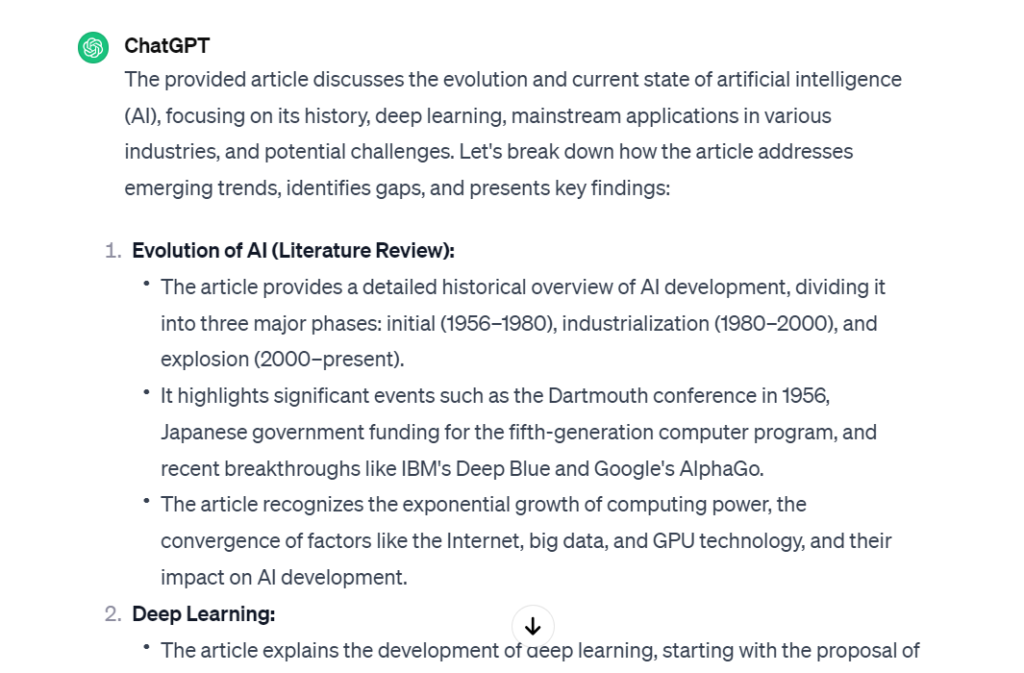
99+ Powerful ChatGPT Prompts for Literature Review
- Introduction and Objective:
What is the main objective of the literature review presented in [input article]?
Could you provide an introduction to the article, outlining the purpose and scope of the literature review?
- Subject Overview and Historical Background:
In [input article], how is the subject under consideration outlined and discussed?
What key aspects of the historical background and evolution of research on the research topic are highlighted in the article?
- Methodologies Used in Research:
How does [input article] discuss the main methodologies employed in conducting research on the research topic?
Are there specific examples or case studies in the article that illustrate the application of these methodologies?
- Categorization of Sources:
Could you share how [input article] categorizes sources into those supporting a particular position, those opposed, and those offering different arguments?
What criteria or framework does the article use for such categorization?
- Distinctiveness and Similarities of Sources:
In [input article], how does the author discuss the distinctiveness of each source and its similarities with others?
Are there specific instances or examples provided to highlight the unique contributions of each source?
- Discussion of Source Characteristics:
What characteristics or attributes of sources are emphasized in [input article] during the literature review?
How does the article evaluate the credibility and reliability of the selected sources?
- Emerging Trends in Literature:
How does [input article] address and discuss emerging trends in the literature on the research topic?
Are there indications of shifts in research focus or methodologies over time?
- Identification of Gaps and Controversies:
Does [input article] identify any gaps or areas of controversy in the existing literature that warrant further exploration?
How does the article suggest addressing these gaps or controversies in future research?
- Recent Studies and Key Findings:
What are the key findings and conclusions presented in the most recent studies on the research topic, as highlighted in [input article]?
How do these findings contribute to the overall understanding of the research area?
- Integration of Historical and Recent Research:
In [input article], how is historical research integrated with recent studies in the literature review?
Are there connections or contrasts highlighted between historical and contemporary research findings?
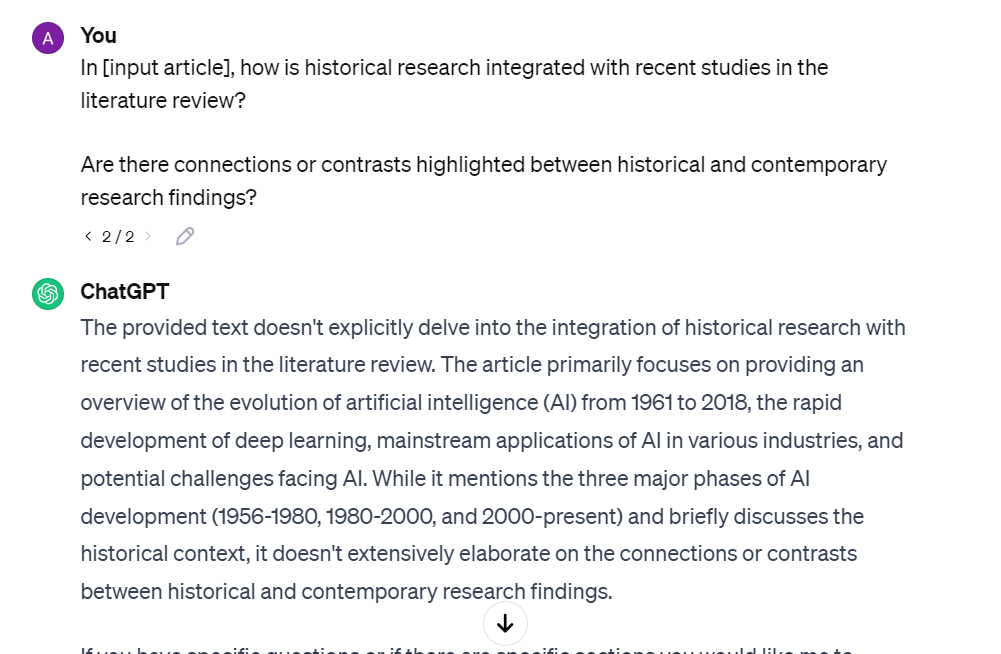
- Analysis of Research Trends Over Time:
Does [input article] provide an analysis of how research trends on the research topic have evolved over time?
Are there discernible patterns or shifts in research focus, methodologies, or conclusions?
- Evaluation of Methodological Rigor:
How does [input article] evaluate the methodological rigor of the studies reviewed in the literature?
Are there criteria or standards used to assess the quality of research methodologies?
- Author’s Position and Perspective:
What is the author’s position or perspective on the research topic, as reflected in [input article]?
Does the article present a balanced view or lean towards a particular viewpoint?
- Inclusion of Diverse Perspectives:
How does [input article] ensure the inclusion of diverse perspectives in the literature review?
Are there limitations or critiques mentioned regarding the diversity of sources included?
- Synthesis of Research Contributions:
In [input article], how are the contributions of different research studies synthesized and presented?
Does the article provide a coherent narrative that integrates diverse findings into a comprehensive understanding?
- Implications for Future Research:
What implications for future research are discussed in [input article] based on the findings of the literature review?
Are there specific recommendations for researchers exploring this research area in the future?
- Alignment with Research Questions:
How well does [input article] align with the research questions or objectives stated at the beginning of the literature review?
Are there deviations or unexpected findings that the article addresses?
- Clarity of Argument and Structure:
Evaluate the clarity of the argument and structure in [input article]’s literature review.
Does the article follow a logical flow, making it easy for the reader to understand the progression of ideas?
- Integration of Multimedia or Visual Aids:
Does [input article] incorporate any multimedia or visual aids to enhance the presentation of the literature review?
How effective are these visual elements in conveying information?
- Overall Contribution to the Field:
Assess the overall contribution of [input article]’s literature review to the field of study.
Does the article bring new insights, perspectives, or methodologies to the existing body of literature?
- Critical Evaluation of Methodologies:
How does [input article] critically evaluate the methodologies used in the reviewed research studies?
Are there any limitations or challenges discussed in the application of these methodologies?
- Author’s Bias and Objectivity:
To what extent does the author of [input article] demonstrate bias or objectivity in presenting and interpreting the reviewed literature?
Are there instances where the author’s perspective might influence the interpretation of findings?
- Inclusion of Cross-Disciplinary Perspectives:
Does [input article] incorporate cross-disciplinary perspectives in the literature review?
How does the article benefit from or contribute to a broader understanding of the research topic?
- Publication Date Considerations:
How does [input article] consider the publication dates of the sources included in the literature review?
Is there a focus on recent studies, or does the article also draw from earlier foundational research?
- Use of Theoretical Frameworks:
Are theoretical frameworks explicitly mentioned and applied in [input article] when discussing the literature?
How do these frameworks contribute to the understanding of the research topic?
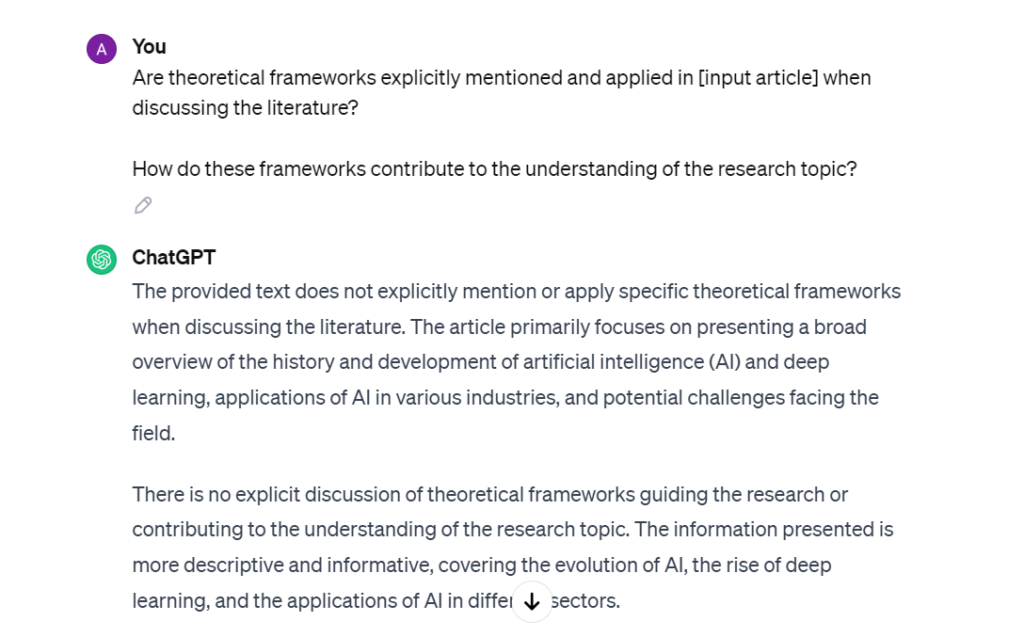
- Discussion of Ethical Considerations:
Does [input article] address ethical considerations related to the reviewed studies, such as participant consent or potential biases?
How does the article navigate and discuss ethical concerns within the context of the literature review?
- Comparison with Previous Reviews:
Does [input article] make comparisons with previous literature reviews on the same or similar topics?
What unique contributions or perspectives does this article bring compared to existing reviews?
- Engagement with Contradictory Evidence:
How does [input article] handle contradictory evidence or findings within the reviewed literature?
Is there an attempt to reconcile conflicting perspectives, or does the article leave room for debate?
- Use of Primary vs. Secondary Sources:
In [input article], is there a distinction made between primary and secondary sources?
How does the use of these sources contribute to the depth and breadth of the literature review?
- Discussion of Limitations and Scope:
Does [input article] openly discuss the limitations of the literature review and the scope of the research covered?
How does the article manage the boundaries of the research topic in relation to the literature review?
- Interplay of Quantitative and Qualitative Studies:
How does [input article] navigate and integrate quantitative and qualitative studies in the literature review?
Is there an exploration of how these different approaches contribute to the overall understanding of the research topic?
- Integration of Theoretical and Empirical Studies:
In [input article], how are theoretical and empirical studies integrated within the literature review?
Is there a clear synthesis of conceptual frameworks with real-world observations?
- Role of Literature Review in Research Design:
Does [input article] discuss how the literature review informed the overall research design or methodology of the study?
What insights from the literature review guided the author’s approach to the research?
- Addressing Confounding Variables:
Does [input article] address potential confounding variables or alternative explanations in the reviewed studies?
How does the article ensure the robustness of the conclusions drawn from the literature?
- Interpretation of Statistical Significance:
How does [input article] interpret and discuss statistical significance in the findings of the reviewed studies?
Is there a clear distinction made between statistically significant and non-significant results?
- Consideration of Cultural and Geographical Variability:
Does [input article] take into account cultural or geographical variability in the literature on the research topic?
How does the article acknowledge or address potential differences in study contexts?
- Acknowledgment of Funding Sources:
Does [input article] provide information on the funding sources for the reviewed studies?
How might the acknowledgment of funding influence the interpretation of the research findings?
- Accessibility of Reviewed Studies:
In [input article], is there any discussion on the accessibility of the reviewed studies (open access, paywalled, etc.)?
How does this factor impact the inclusivity of the literature review?
- Consideration of Longitudinal Studies:
Does [input article] incorporate and discuss longitudinal studies in the literature review?
How does the consideration of time dynamics contribute to the understanding of the research topic?
- Use of Meta-Analysis or Systematic Review:
Does [input article] employ meta-analysis or systematic review techniques in synthesizing the literature?
How does this methodological choice impact the comprehensiveness of the literature review?
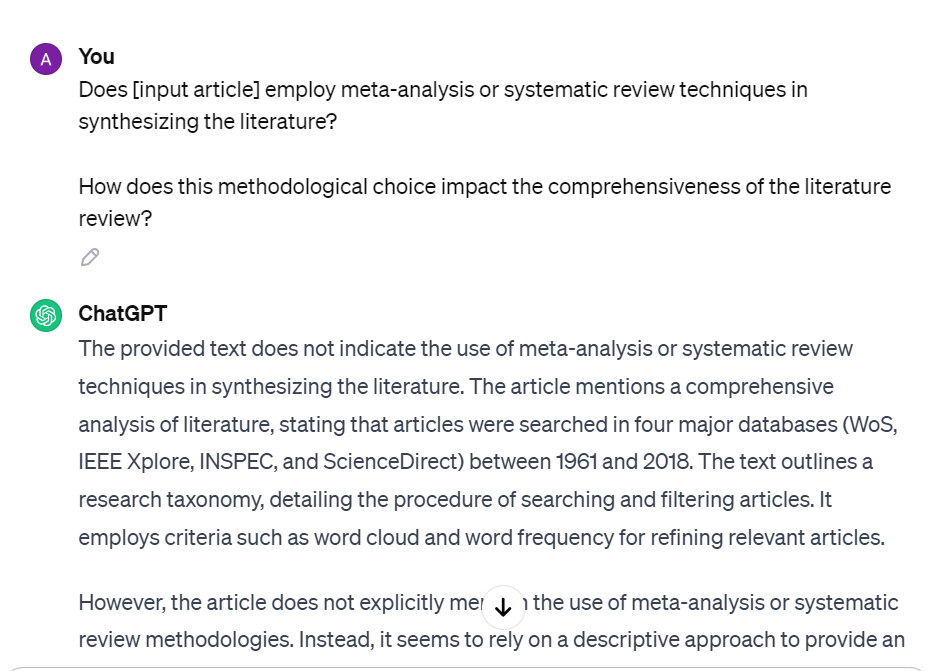
- Analysis of Citation Patterns:
How does [input article] analyze and discuss citation patterns within the reviewed literature?
Are there notable trends or influential studies that are frequently cited in the literature review?
- Consideration of Cultural Sensitivity:
Does [input article] address cultural sensitivity in the literature review, especially when discussing studies conducted in diverse cultural contexts?
How does the article navigate potential biases arising from cultural differences?
- Treatment of Null Findings:
How does [input article] treat studies with null findings in the literature review?
Is there a discussion on the importance of reporting negative results?
- Connection with Theoretical Framework:
In [input article], how is the theoretical framework used to guide the organization and interpretation of the literature review?
Does the article explicitly link theoretical concepts with the reviewed studies?
- Integration of Stakeholder Perspectives:
Does [input article] incorporate perspectives from stakeholders or practitioners in the field within the literature review?
How does this integration contribute to a more comprehensive understanding of the research topic?
- Exploration of Methodological Innovations:
How does [input article] explore and discuss methodological innovations or advancements within the reviewed literature?
Are there instances where the article highlights emerging research methodologies?
- Interdisciplinary Connections:
Does [input article] establish connections with other disciplines or fields of study in the literature review?
How does this interdisciplinary approach enrich the overall narrative?
- Presentation of Conceptual Frameworks:
How are conceptual frameworks presented in [input article] within the context of the literature review?
Is there clarity in articulating how these frameworks contribute to the understanding of the research topic?
- Discussion on Peer Review:
Does [input article] provide insights into the peer review process of the reviewed studies?
How might the peer review status of studies impact the reliability of the literature presented?
- Treatment of Methodological Biases:
How does [input article] address and discuss potential biases in the methodologies of the reviewed studies?
Is there a critical evaluation of methodological choices that may influence the validity of the findings?
- Consideration of Researcher Positionality:
Does [input article] reflect on the positionality of the researchers conducting the literature review?
How might the researchers’ perspectives and biases influence the interpretation of the literature?
- Discussion of Data Sources:
How does [input article] discuss and evaluate the types of data sources used in the reviewed studies?
Is there emphasis on the reliability and validity of data utilized in the literature review?
- Incorporation of Gray Literature:
Does [input article] incorporate or discuss the inclusion of gray literature in the literature review?
How might this inclusion impact the comprehensiveness of the review?
- Identification of Pivotal Studies:
Does [input article] identify and discuss studies considered pivotal or seminal in the literature on the research topic?
How are these pivotal studies positioned within the broader context of the review?
- Engagement with Researcher Dialogues:
How does [input article] engage with ongoing dialogues or debates among researchers in the field?
Is there evidence of the article contributing to or responding to existing scholarly conversations?
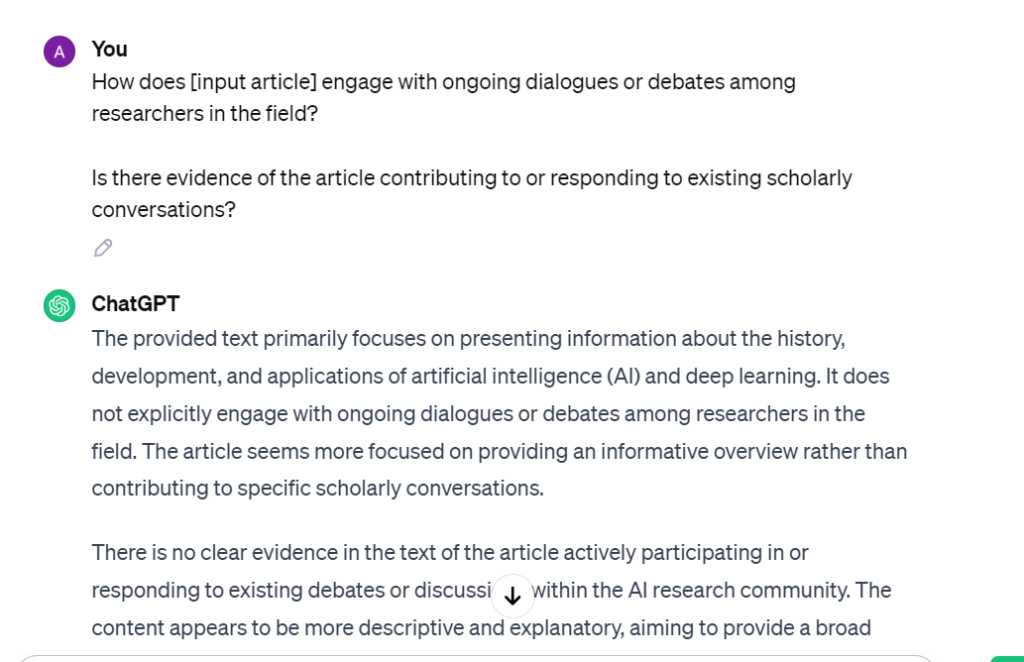
- Treatment of Inconsistencies in Findings:
Does [input article] address inconsistencies or conflicting findings among the reviewed studies?
How does the article navigate and explain discrepancies in research outcomes?
- Reflection on Theoretical Framework Evolution:
Does [input article] reflect on the evolution of theoretical frameworks over time in the literature on the research topic?
Are there indications of shifts in theoretical perspectives or paradigms?
- Discussion of Literature Review Scope:
How does [input article] explicitly define and discuss the scope of the literature review?
Are there clear criteria or parameters for the inclusion and exclusion of studies?
- Consideration of Cultural Bias in Studies:
Does [input article] consider and discuss potential cultural bias in the studies reviewed?
How does the article address the generalizability of findings across diverse cultural contexts?
- Integration of Real-world Implications:
How does [input article] integrate real-world implications or applications of the reviewed studies?
Are there discussions on the practical significance of research findings in the literature review?
- Assessment of Data Quality:
How does [input article] assess the quality of data presented in the reviewed studies?
Are there discussions on the reliability and validity of the data sources?
- Incorporation of Cross-Cultural Studies:
Does [input article] incorporate cross-cultural studies in the literature review?
How does the article acknowledge and analyze cultural variations in research findings?
- Analysis of Authorial Perspectives:
How does [input article] analyze the perspectives and biases of the authors of the reviewed studies?
Are there indications of authorial influence on the interpretation of results?
- Treatment of Conceptual Ambiguities:
How does [input article] address and navigate conceptual ambiguities or inconsistencies within the reviewed literature?
Are efforts made to clarify and resolve conceptual issues?
- Discussion on Data Collection Techniques:
Does [input article] discuss the data collection techniques employed in the studies reviewed?
How do these techniques contribute to the overall validity of the research findings?
- Consideration of Research Design Limitations:
How does [input article] discuss limitations in the research design of the studies included in the literature review?
Is there reflection on how these limitations might impact the robustness of the findings?
- Evaluation of Statistical Methods:
Does [input article] evaluate the statistical methods used in the reviewed studies?
Are there discussions on the appropriateness of statistical analyses employed?
- Examination of Sample Representativeness:
How does [input article] examine and discuss the representativeness of samples in the reviewed studies?
Is there consideration of how sample characteristics may impact generalizability?
- Treatment of Cross-Sectional Studies:
Does [input article] discuss the inclusion and treatment of cross-sectional studies in the literature review?
How does the article weigh the strengths and limitations of cross-sectional research?
- Engagement with Methodological Innovations:
How does [input article] engage with and evaluate any methodological innovations presented in the reviewed literature? Are there indications of how these innovations advance the field?
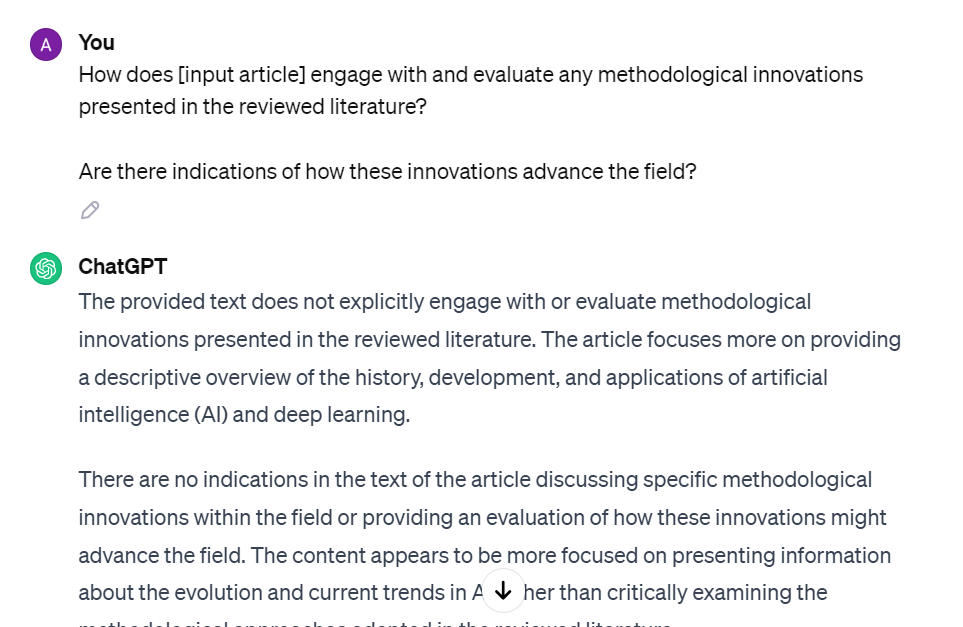
- Integration of Longitudinal Findings:
In [input article], how are longitudinal findings integrated into the overall narrative of the literature review?
Is there a discussion on the temporal dynamics of research outcomes?
- Discussion on Replication Studies:
Does [input article] discuss the presence of replication studies in the reviewed literature?
How does the article consider the impact of replication on the reliability of research findings?
- Reflection on Researcher Subjectivity:
How does [input article] reflect on the subjectivity of researchers involved in the reviewed studies?
Are there discussions on how researcher subjectivity may have influenced study outcomes?
- Treatment of Publication Bias:
Does [input article] address the potential impact of publication bias on the findings presented in the literature review?
How might the article navigate the limitations introduced by publication bias?
- Use of Meta-Synthesis Techniques:
Does [input article] employ meta-synthesis techniques in synthesizing qualitative research in the literature review?
How does the article ensure a cohesive integration of diverse qualitative findings?
- Discussion on Data Interpretation Challenges:
How does [input article] discuss challenges in interpreting data within the reviewed studies?
Are there specific examples or instances highlighted in the article?
- Analysis of Variability in Methodological Rigor:
Does [input article] analyze and discuss variability in the methodological rigor across the reviewed studies?
Are there patterns or trends identified in the consistency of research methodologies?
- Treatment of Cross-Validation:
Does [input article] discuss the use of cross-validation techniques in the reviewed studies, especially in quantitative research?
How does cross-validation contribute to the reliability of study outcomes?
- Examination of Peer-Reviewed Journals:
How does [input article] evaluate the inclusion of studies from peer-reviewed journals in the literature review?
Is there a discussion on the importance of the peer review process?
- Integration of Researcher Reflections:
Does [input article] integrate reflections or insights from the researchers themselves within the reviewed studies?
How do these researcher reflections contribute to the depth of the literature review?
- Discussion on Inter-Rater Reliability:
How does [input article] discuss the inter-rater reliability of studies involving multiple observers or coders?
Is there exploration of how variability in ratings might impact the overall findings?
- Treatment of Ethical Approval and Informed Consent:
Does [input article] address the ethical approval and informed consent processes of the studies included in the literature review?
How are ethical considerations in research design discussed?
- Analysis of Variable Operationalization:
How does [input article] analyze the operationalization of variables in the reviewed studies?
Are there discussions on how differences in variable definitions might affect comparisons?
- Evaluation of Research Instrument Validity:
Does [input article] evaluate the validity of research instruments used in the reviewed studies?
How might variations in instrument validity impact the reliability of study outcomes?
- Assessment of Study Sample Size:
How does [input article] assess the adequacy of sample sizes in the reviewed studies?
Is there discussion on how sample size influences the generalizability of findings?
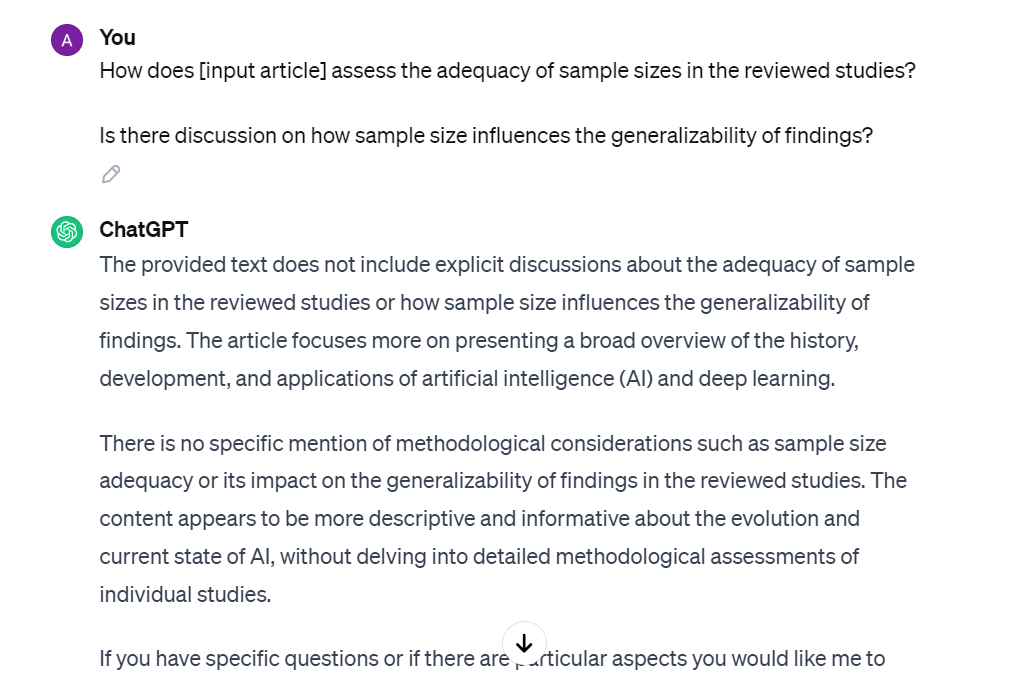
- Treatment of Multivariate Analyses:
Does [input article] discuss the use and interpretation of multivariate analyses in the reviewed studies?
How do these analyses contribute to a comprehensive understanding of the research topic?
- Incorporation of Open-Access Literature:
Does [input article] consider the inclusion of open-access literature in the literature review?
How might the accessibility of studies impact the inclusivity of the review?
- Analysis of Researcher Conflict of Interest:
How does [input article] analyze and discuss any conflicts of interest among the researchers in the reviewed studies?
Is there consideration of how conflicts of interest might affect study outcomes?
- Discussion on Ecological Validity:
Does [input article] discuss the ecological validity of the studies included in the literature review?
How might the generalizability of findings to real-world settings be addressed?
- Integration of Mixed-Methods Studies:
In [input article], how are mixed-methods studies integrated into the literature review?
Are there discussions on how combining qualitative and quantitative approaches enriches the review?
- Evaluation of Study Generalizability:
How does [input article] evaluate the generalizability of findings from the reviewed studies?
Is there discussion on the external validity of the research presented?
- Assessment of Literature Review Consistency:
How does [input article] maintain consistency in presenting and analyzing the literature throughout the review?
Are there clear criteria for determining consistency in the selection and treatment of studies?
- Consideration of Temporal Changes:
Does [input article] consider temporal changes in the literature, especially in terms of evolving research trends?
How are shifts in research focus over time discussed in the literature review?
- Analysis of Statistical Power:
How does [input article] analyze and discuss the statistical power of the reviewed studies?
Are there considerations of how statistical power affects the ability to detect significant effects?
- Engagement with Conceptual Replications:
Does [input article] engage with the concept of conceptual replications in the reviewed literature?
How are conceptual replications discussed in the context of study reliability?
- Treatment of Measurement Invariance:
How does [input article] discuss measurement invariance in studies with multiple groups or time points?
Is there exploration of how measurement invariance impacts the comparability of findings?
- Analysis of Study Funding Sources:
Does [input article] analyze and discuss the funding sources of the studies included in the literature review?
How might study funding influence the research outcomes or perspectives presented?
- Integration of Research Critiques:
In [input article], how are critiques or comments from the researchers themselves integrated into the literature review?
How do these critiques contribute to the overall evaluation of the reviewed studies?
- Discussion on Cross-Validation Techniques:
Does [input article] discuss the use of cross-validation techniques in the reviewed studies, especially in predictive modeling?
How does cross-validation contribute to the reliability and robustness of the research findings?
- Analysis of Conceptual Synthesis:
How does [input article] perform conceptual synthesis in integrating diverse theoretical perspectives within the literature review?
Are there instances of novel conceptual frameworks emerging from the synthesis?
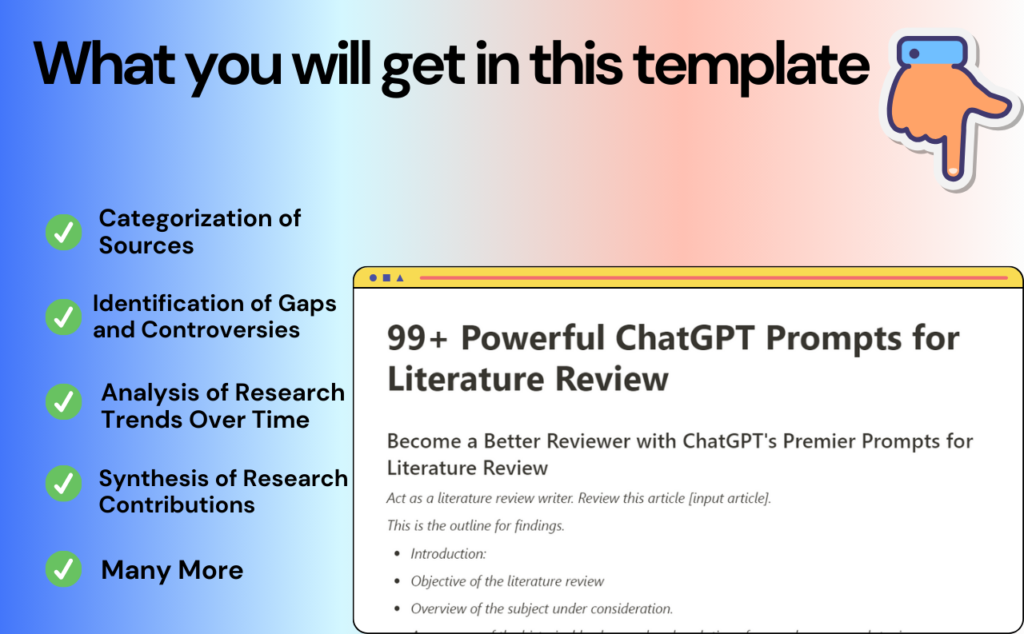
Get 99+ ChatGPT Prompts for Literature Review – Complete List Here!
Free Prompts forever – Complete Literature Review Prompts List

Final Thoughts
In conclusion, ChatGPT Prompts for article review offer a streamlined solution for busy professionals. Simplifying the review process, these pre-built prompts save valuable time, energy, and the hassle of crafting optimized prompts. Review your content effortlessly and conquer challenges with these tools in hand. Embrace the benefits of ChatGPT Prompts for a smoother review journey. Happy Reviewing and exploring the enhanced possibilities!

